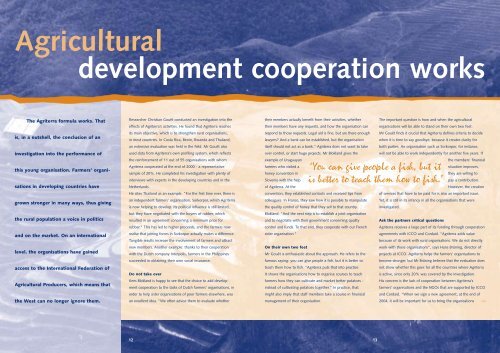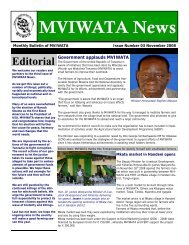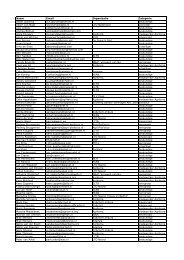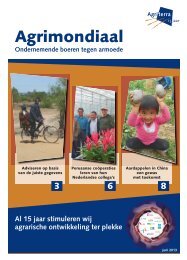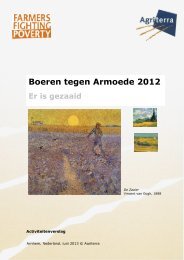télécharger - Agriterra
télécharger - Agriterra
télécharger - Agriterra
You also want an ePaper? Increase the reach of your titles
YUMPU automatically turns print PDFs into web optimized ePapers that Google loves.
Agriculturaldevelopment cooperation worksThe <strong>Agriterra</strong> formula works. Thatis, in a nutshell, the conclusion of aninvestigation into the performance ofthis young organisation. Farmers’ organisationsin developing countries havegrown stronger in many ways, thus givingthe rural population a voice in politicsand on the market. On an internationallevel, the organisations have gainedaccess to the International Federation ofAgricultural Producers, which means thatthe West can no longer ignore them.Researcher Christian Gouët conducted an investigation into theeffects of <strong>Agriterra</strong>’s activities. He found that <strong>Agriterra</strong> reachesits main objective, which is to strengthen rural organisations,in most countries. In Costa Rica, Benin, Rwanda and Thailand,an extensive evaluation was held in the field. Mr Gouët alsoused data from <strong>Agriterra</strong>’s own profiling system, which reflectsthe reinforcement of 11 out of 55 organisations with whom<strong>Agriterra</strong> cooperated at the end of 2000 - a representativesample of 20%. He completed his investigation with plenty ofinterviews with experts in the developing countries and in theNetherlands.He cites Thailand as an example. "For the first time ever, there isan independent farmers’ organisation, Sorkorpor, which <strong>Agriterra</strong>is now helping to develop. Its political influence is still limited,but they have negotiated with the buyers of rubber, whichresulted in an agreement concerning a minimum price forrubber." This has led to higher proceeds, and the farmers nowrealise that joining forces in Sorkorpor actually makes a difference.Tangible results increase the involvement of farmers and attractnew members. Another example: thanks to their cooperationwith the Dutch company Interpolis, farmers in the Philippinessucceeded in obtaining their own social insurance.Do not take overKees Blokland is happy to see that the choice to add developmentcooperation to the tasks of Dutch farmers’ organisations, inorder to help sister organisations of poor farmers elsewhere, wasan excellent idea. "We often advise them to evaluate whethertheir members actually benefit from their activities, whethertheir members have any requests, and how the organisation canrespond to those requests. Legal aid is fine, but are there enoughlawyers? And a bank can be established, but the organisationitself should not act as a bank." <strong>Agriterra</strong> does not want to takeover control, or start huge projects. Mr Blokland gives theexample of Uruguayanfarmers who visited ahoney convention inSlovenia with the helpof <strong>Agriterra</strong>. At theconvention, they established contacts and received tips fromcolleagues. In France, they saw how it is possible to manipulatethe quality control of honey that they sell to that country.Blokland: "And the next step is to establish a joint organisationand to negotiate with their government concerning qualitycontrol and funds. To that end, they cooperate with our Frenchsister organisation."On their own two feetMr Gouët is enthusiastic about the approach. He refers to thefamous saying: you can give people a fish, but it is better toteach them how to fish. "<strong>Agriterra</strong> puts that into practice.It shows the organisations how to organise courses to teachfarmers how they can cultivate and market better potatoes -instead of cultivating potatoes together." In practice, thatmight also imply that staff members take a course in financialmanagement of their organisation.The important question is how and when the agriculturalorganisations will be able to stand on their own two feet.Mr Gouët finds it crucial that <strong>Agriterra</strong> defines criteria to decidewhen it is time to say goodbye, because it creates clarity forboth parties. An organisation such as Sorkorpor, for instance,will not be able to work independently for another five years. Ifthe members’ financialsituation improves,they are willing topay a contribution.However, the creationof services that have to be paid for is also an important issue.Yet, it is still in its infancy in all the organisations that wereinvestigated.‘You can give people a fish, but itis better to teach them how to fish.’Ask the partners critical questions<strong>Agriterra</strong> receives a large part of its funding through cooperationagreements with ICCO and Cordaid. "<strong>Agriterra</strong> adds valuebecause of its work with rural organisations. We do not directlywork with those organisations", says Hans Brüning, director ofprojects at ICCO. <strong>Agriterra</strong> helps the farmers’ organisations tobecome stronger, but Mr Brüning believes that the evaluation doesnot show whether this goes for all the countries where <strong>Agriterra</strong>is active, since only 20% was covered by the investigation.His concern is the lack of cooperation between <strong>Agriterra</strong>’sfarmers’ organisations and the NGOs that are supported by ICCOand Cordaid. "When we sign a new agreement, at the end of2004, it will be important for us to bring the organisations >>12 13


